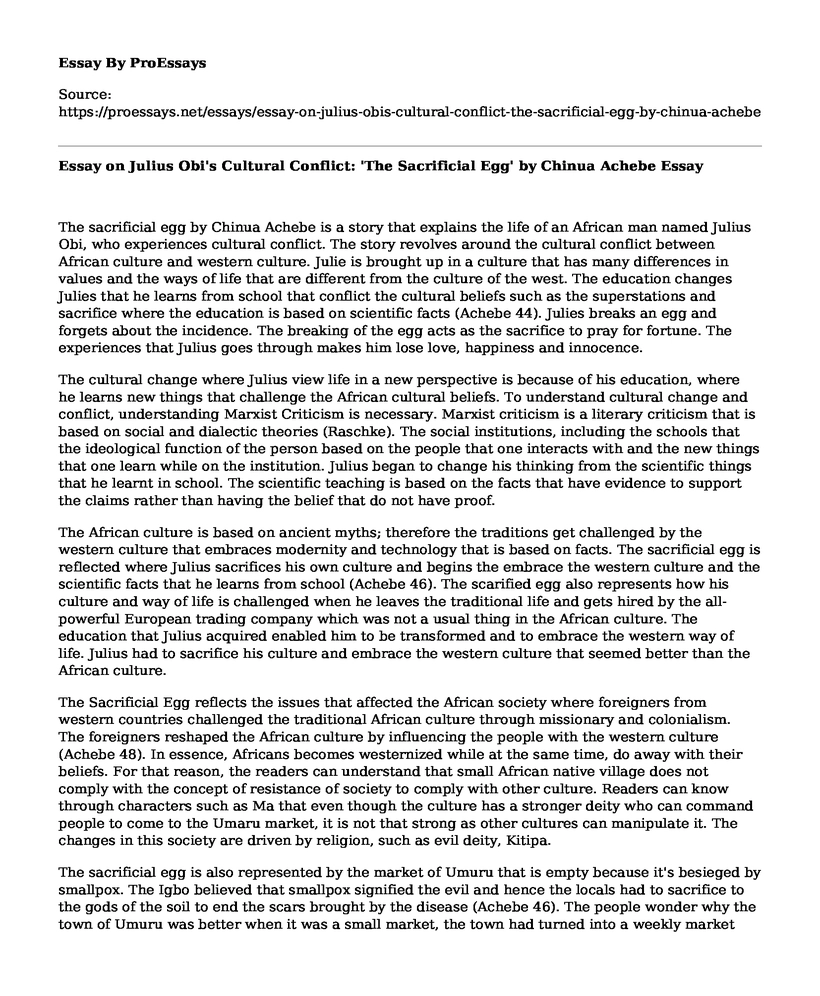The sacrificial egg by Chinua Achebe is a story that explains the life of an African man named Julius Obi, who experiences cultural conflict. The story revolves around the cultural conflict between African culture and western culture. Julie is brought up in a culture that has many differences in values and the ways of life that are different from the culture of the west. The education changes Julies that he learns from school that conflict the cultural beliefs such as the superstations and sacrifice where the education is based on scientific facts (Achebe 44). Julies breaks an egg and forgets about the incidence. The breaking of the egg acts as the sacrifice to pray for fortune. The experiences that Julius goes through makes him lose love, happiness and innocence.
The cultural change where Julius view life in a new perspective is because of his education, where he learns new things that challenge the African cultural beliefs. To understand cultural change and conflict, understanding Marxist Criticism is necessary. Marxist criticism is a literary criticism that is based on social and dialectic theories (Raschke). The social institutions, including the schools that the ideological function of the person based on the people that one interacts with and the new things that one learn while on the institution. Julius began to change his thinking from the scientific things that he learnt in school. The scientific teaching is based on the facts that have evidence to support the claims rather than having the belief that do not have proof.
The African culture is based on ancient myths; therefore the traditions get challenged by the western culture that embraces modernity and technology that is based on facts. The sacrificial egg is reflected where Julius sacrifices his own culture and begins the embrace the western culture and the scientific facts that he learns from school (Achebe 46). The scarified egg also represents how his culture and way of life is challenged when he leaves the traditional life and gets hired by the all-powerful European trading company which was not a usual thing in the African culture. The education that Julius acquired enabled him to be transformed and to embrace the western way of life. Julius had to sacrifice his culture and embrace the western culture that seemed better than the African culture.
The Sacrificial Egg reflects the issues that affected the African society where foreigners from western countries challenged the traditional African culture through missionary and colonialism. The foreigners reshaped the African culture by influencing the people with the western culture (Achebe 48). In essence, Africans becomes westernized while at the same time, do away with their beliefs. For that reason, the readers can understand that small African native village does not comply with the concept of resistance of society to comply with other culture. Readers can know through characters such as Ma that even though the culture has a stronger deity who can command people to come to the Umaru market, it is not that strong as other cultures can manipulate it. The changes in this society are driven by religion, such as evil deity, Kitipa.
The sacrificial egg is also represented by the market of Umuru that is empty because it's besieged by smallpox. The Igbo believed that smallpox signified the evil and hence the locals had to sacrifice to the gods of the soil to end the scars brought by the disease (Achebe 46). The people wonder why the town of Umuru was better when it was a small market, the town had turned into a weekly market (Amuta). The sacrifices were made to the gods in search of favour to restore sanity in the town of Umuru. The Marxist criticism reflects the changes that occurred in the village of Umuru where people change their way of life that they used to live before. The transformed village enabled the people to begin trading where they brought fish and yams to the village.
The sacrificial egg makes Julius and other people from the community to be trapped in a dilemma whether they embrace the western culture or stick to their own traditional culture and beliefs. The author of the story compares the western and African culture on the differences and similarities(Achebe 49). The author illustrates how it's difficult to change the people from one culture to the other. No matter how people try to resist western culture, they still embrace the culture of the west in areas that they believe will improve their lives. Julius embraced education because he believed that education would transform his life by securing employment. The world is increasingly changing, where people are embracing the culture that they like as more people from all over the world interacts. Marx argued that society is constantly changing as people interact where people from different backgrounds interact and learn from each other.
Works Cited
Achebe, Chinua. Girls at war and other stories. Anchor Canada, 2010.
Amuta, Chidi. Theory of African Literature: Implications for practical criticism. Zed Books Ltd., 2017.
Raschke, Carl. "From the Secular City to the Regime of Neoliberalism." American Book Review 39.5 (2018): 8-14.
Cite this page
Essay on Julius Obi's Cultural Conflict: 'The Sacrificial Egg' by Chinua Achebe. (2023, Apr 09). Retrieved from https://proessays.net/essays/essay-on-julius-obis-cultural-conflict-the-sacrificial-egg-by-chinua-achebe
If you are the original author of this essay and no longer wish to have it published on the ProEssays website, please click below to request its removal:
- Was Creon Right in Condemning Antigone? Essay Example
- Essay Sample on Hamlets Problem
- Analysis of the Film Fences
- Essay Example on Social Construction: Understanding Meaning in Society
- Essay Example on Life: Contrasting Perspectives in An Arundel Tomb & Ozymandias
- Essay on Gender Roles in Ancient Greek Tragedy: A Look at Women in Sophocles' Antigone
- Essay Example on Cultural Awareness: A Necessity for Caregivers in Society







